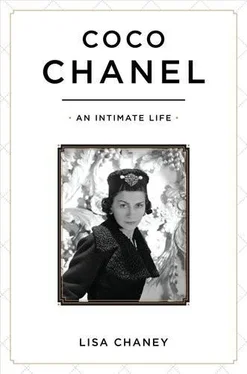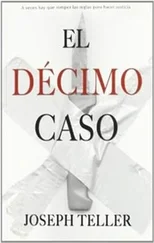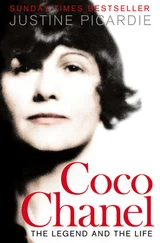Julia-Berthe and Gabrielle would have seen the awful decline in their mother’s health and been powerless to halt it. Quite probably, they shared the room in which she slept. Almost certainly, it was they who discovered her death. Albert’s brother Hippolyte signed the death certificate and made the arrangements for Jeanne’s funeral. 2Those in the family who could have told more never would.
Jeanne Chanel’s death was to usher in perhaps the most mysterious period in her children’s lives. Gabrielle’s early childhood is obscure enough, but for the next six or so years there is virtual silence. Throughout her life, Gabrielle would remain self-conscious about her background. Indeed, it was rumored that she paid some of her family and her associates not to speak about her past and negotiated the destruction of certain documents. Whatever the truth, while she failed to hide it completely, she did succeed in disguising her early life. In doing this, she not only censored the most formative period of her life, she tried to destroy her early self.
The stories she told her friend Paul Morand, while often a remolding of events, nonetheless offer a remarkable glimpse into her complex relationship with her past. Following her father’s example, she hid from the childhood that had damaged her by blurring the edges of fact. Thus she would say, “Reality doesn’t make me dream… and I like to dream.” 1
In searching for reality in Gabrielle’s stories, what one repeatedly finds is that the truth of an event for her lay not in the fact but in the feeling. She retained the emotional and psychological residue of the past. As a result, at the heart of her tales one often discovers the tenor of what happened. “My earliest childhood. Those words,” she said, “make me shudder. No childhood was less gentle. All too soon I realized that life was a serious matter.” 2
Gabrielle recalled her mother in no more than a handful of anecdotes. In most of them we notice the little girl’s capacity for destructiveness, and her mother’s telling response. In one incident, when the children were staying with their mother at Uncle Augustin’s, the adults had shut the children out of the way. Bored with their seclusion, Gabrielle and her siblings noticed how easily the damp wallpaper could be removed. At first it was just a little strip they took off, but then, to their great amusement, they found they could pull off whole sections at once. They peeled off more, then clambered on chairs they’d piled up, gradually revealing the pink plaster. Then they stripped the ceiling! Their mother eventually came in to discover this “disaster.” She didn’t reprimand the children, she just stood silently weeping. Little Gabrielle was so taken aback by her mother’s response that she “ran away howling with sorrow.” Gabrielle soon recognized that life was indeed “a solemn affair, since it caused mothers to cry.” 3
On another occasion, the children were put to bed in a workroom. Bunches of grapes were hanging from the rafters in paper bags, to preserve them for the winter. Throwing a pillow, Gabrielle brought down a paper bag. This was hilarious. She felled another one, then set to work with a bolster. Finally, she had “brought the entire harvest of grapes down, so that they were strewn over the wooden floor… For the first time in my life I was whipped. The humiliation was something I would never forget.” 4
Jeanne’s family scorned her ramshackle life with Albert, and her aunts made superior remarks, such as “These people live like traveling circus folk.” As for the children, Gabrielle sensed particular disapproval of herself. One aunt prophesied that she would “turn out badly”; another talked of “selling her to the gypsies” and “discussed beating her with nettles.” Her defense was “stubborn defiance.” Thus upping the stakes, she provoked still greater chastisement, which in turn “only made me more uncivilized, more fractious.” 5One of the saddest legacies of this pattern of behavior was the self-loathing Gabrielle described. In childhood and youth, she believed she was ugly, almost cursed. Only much later was she proud of whom she had become. 6
After Jeanne’s death, her aunts, uncles and grandparents were unwilling to take responsibility for Albert’s children. And by now it was clear he was not going to do so himself. Perhaps no one could afford to feed and house these extra mouths; perhaps their impoverished and seminomadic lifestyle had left them unacceptably feral in the eyes of their relatives. Clearly, the bond between the children and their extended family wasn’t strong, or a way would have been found to take in at least one or two of them. Gabrielle was left with an undying grudge against her family. She struggled to camouflage it, but her father’s abandonment was to haunt Gabrielle, revealing its corrosive power over and over again.
The pain of blaming her father was more than she could bear. So she did the only thing that gave her any control: she retold their story. In the retelling, Albert was absolved of almost all blame. Gabrielle would tell how, after her mother’s death, when she was still in deep mourning, she had arrived with her father at the miserable house of some unwelcoming old aunts. Albert ignored his six-year-old daughter’s pleas and left her there without further ado. He then sailed for America, where he went to seek his fortune. And this time he succeeded. Having at last made a fortune, he returned and visited his pining daughter. He wrote to her when he could. But he never took her to the new home he had promised, and Gabrielle remained with her aunts, effectively an orphan.
The more accurate details of the story are these: Albert never traveled to America; neither did he make anything resembling a fortune. He was a drunken braggart, his life one of fantasy and evasion. When Gabrielle’s mother died, Gabrielle was in fact eleven, not six. Neither was she alone in the place where her father so callously left her. She was accompanied by two sisters, Julia and Antoinette. But who were these aunts? According to family memory, they were the nuns of the convent orphanage at Aubazine, a small village in the Corrèze, not far from Brive-la-Gaillarde, where the children’s mother had died. While the records from this period are lost, it was in this convent of Aubazine that Gabrielle would be cloistered, with her sisters and other orphan girls, for the following six or so years.
The young Gabrielle was desperate at her father’s imminent departure and cried out, “Take me away from here! Take me away!” Albert told her not to worry, everything would be all right; he would return and take her with him as soon as he was able. But he had no intention of returning. Over the years, Gabrielle usually kept to the story about Albert’s journey to America; it enabled her to maintain her pride. But, on other occasions, she communicated her sense of abandonment, saying, “Those were his last words. He did not come back.”
Sometimes, she would say that he wrote telling her to trust him and that his business was doing well, but the other, more levelheaded Gabrielle would say, “We didn’t hear another word from him.” Almost certainly, Albert Chanel never wrote to Gabrielle or to any of his other children, and Gabrielle waited in vain for the father whom she never saw again. This final rejection somehow sealed her fate. Although she was to become a woman of great fortitude, Gabrielle would never prove emotionally resilient when left, particularly when the leaving was by a man. In summing up her childhood, she would say she knew “no home, no love, no father and mother. It was terrible.” 7And as she had in that childhood, in adulthood she would weave herself new stories in order to survive.
Читать дальше












